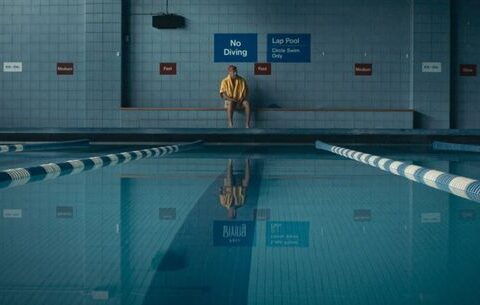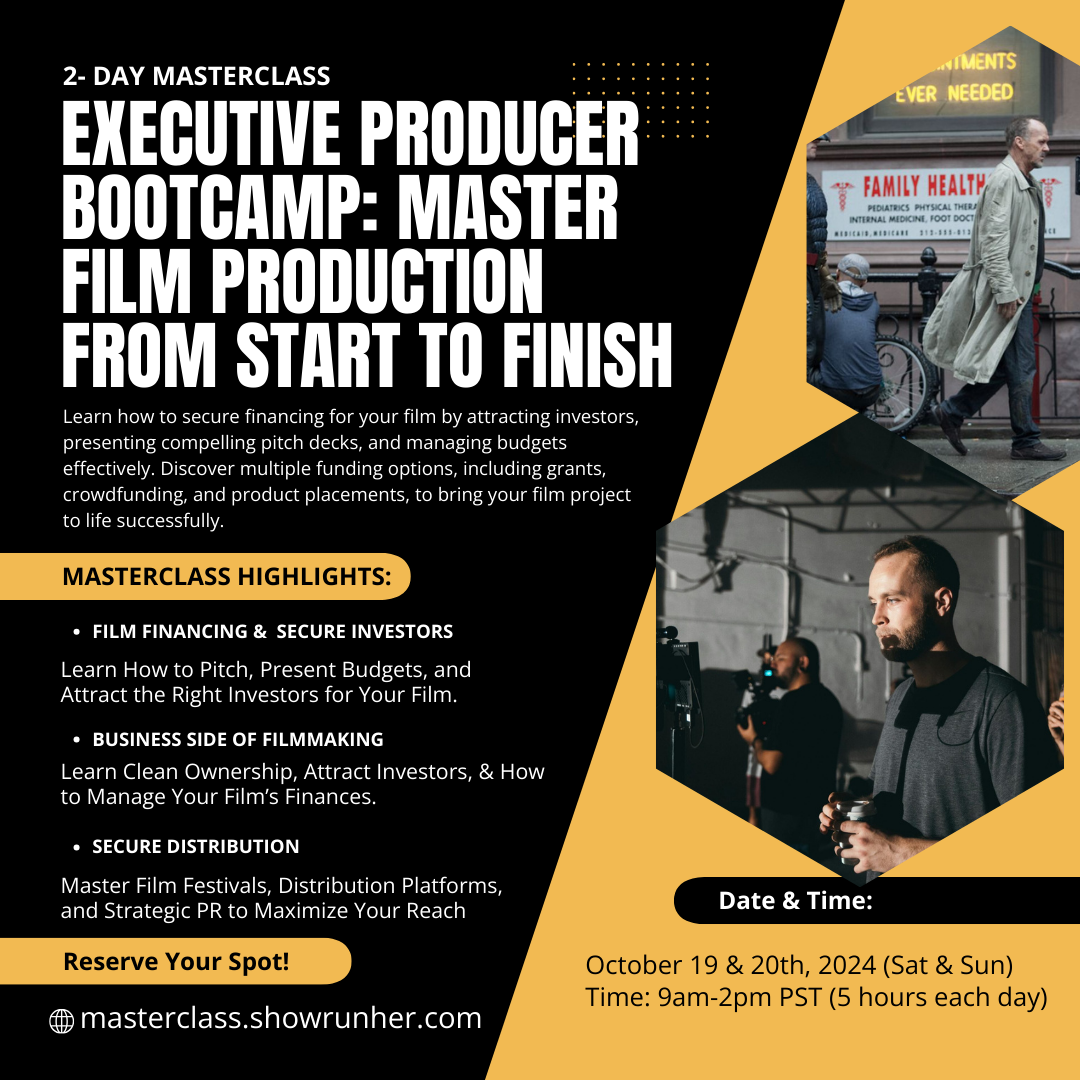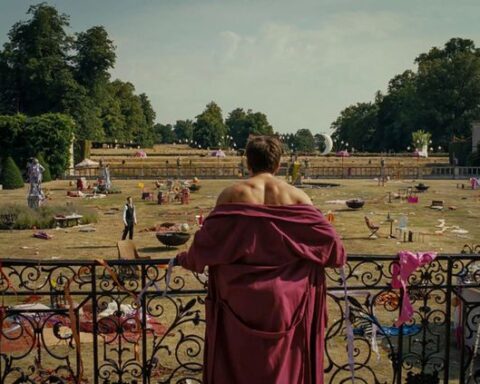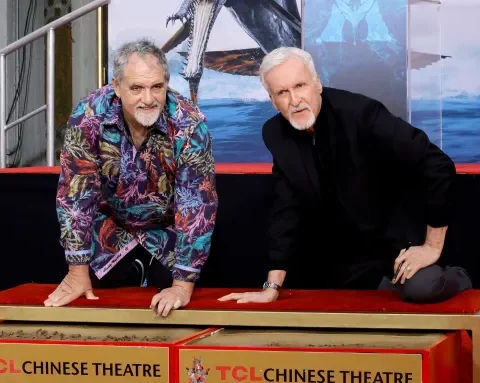In filmmaking, two roles are essential for turning a vision into reality: the Executive Producer (EP) and the Director. While both are key to a film’s success, their responsibilities differ greatly. The EP handles the business and financial side, ensuring the film gets made, while the Director is the creative force, bringing the story to life on screen.
This blog breaks down the duties of each role, showing how they collaborate to produce a film from development to distribution.
What is an Executive Producer?
The Executive Producer oversees the financial and logistical aspects of a film. They secure funding, manage contracts, and ensure the project stays on budget. Their focus is more on the business side, ensuring the film has the resources it needs to be completed. EPs can be financiers, studio executives, or influential individuals who attract talent or funding. Also, Keep in mind Executive Producers and Producers also have different jobs.
What is a Director?
On the other hand, the Director is the creative lead. They guide the artistic vision of the film, working with actors, crew, and editors to bring the story to life. While the EP focuses on logistics, the Director handles the creative decisions, from camera angles to performances, ensuring the film’s artistic vision is realized.
Development Phase
During development, both the Executive Producer and Director are essential in laying the groundwork for the film’s success. However, they each contribute in unique ways:
Executive Producer Duties:
- Securing Funding: The EP finds investors or studio backing to finance the project.
- Building the Team: The EP helps hire the director, screenwriter, and sometimes key actors.
- Budget Setup: The EP sets the project’s initial budget.
- Contracting: The EP manages the legal aspects, ensuring contracts are in place.
- Collaboration with the Director: The EP ensures the budget aligns with the director’s vision.
Director Duties:
- Script Refinement: The Director collaborates with the writer to align the script with their vision.
- Visualizing the Film: The Director develops the tone, style, and look of the film.
- Casting Input: The Director weighs in on casting choices.
- Storyboard Creation: They start preparing storyboards and visual research.
- Creative Collaboration: The Director works with the EP to ensure the film’s vision fits the budget.
Pre-Production Phase
Once the project moves into pre-production, both roles continue to evolve. At this stage, planning and preparation take center stage:
Executive Producer Duties:
- Finalizing the Budget: The EP ensures all financial details are confirmed.
- Managing Contracts: The EP continues handling contracts for talent and crew.
- Monitoring Pre-Production: The EP keeps an eye on the schedule to ensure deadlines are met.
- Approving Hires: The EP signs off on department head hires.
- Logistics: The EP secures locations, equipment, and permits.
Director Duties:
- Casting & Rehearsals: The Director finalizes casting and starts rehearsing with actors.
- Shot Lists: The Director plans each scene by preparing detailed shot lists.
- Location Scouting: The Director works with the production team to find suitable locations.
- Collaboration with Cinematographer: The Director and DP decide on the visual style.
- Set Design: The Director oversees the set design to ensure it aligns with their vision.
Production Phase
As pre-production wraps up, the focus shifts to production, where the real work of bringing the film to life happens. Both the Executive Producer and Director are heavily involved, but their focus diverges:
Executive Producer Duties:
- Overseeing Production: The EP ensures the production stays on schedule and budget.
- Problem Solving: The EP steps in to resolve any major issues.
- Maintaining Investor Relations: The EP keeps investors updated on progress.
- Approving Expenses: The EP approves significant spending decisions.
- Logistical Oversight: The EP ensures everything on set runs smoothly.
Director Duties:
- Directing the Cast: The Director guides actors to get the right performance.
- Overseeing Cinematography: The Director works with the DP to capture the perfect shot.
- On-the-Fly Decisions: The Director adapts to changes as needed during filming.
- Managing the Crew: The Director ensures the crew is aligned with the creative vision.
- Creative Problem Solving: The Director resolves creative challenges that arise during filming.
Post-Production Phase
Once filming is complete, the production enters post-production, where the film is edited, refined, and polished. This phase requires the Director to fine-tune the creative elements, while the EP ensures the film is finished on time and on budget.
Executive Producer Duties:
- Monitoring Post-Production Costs: The EP ensures the budget is maintained during editing.
- Reviewing Edits: The EP reviews cuts to ensure the film’s commercial viability.
- Managing Deadlines: The EP ensures post-production is completed on schedule.
- Distribution Planning: The EP strategizes the film’s release.
- Marketing: The EP coordinates with PR teams for promotional efforts.
Director Duties:
- Shaping the Edit: The Director works closely with the editor to refine the final cut.
- Overseeing Sound and VFX: The Director ensures the sound and visual effects match their vision.
- Final Cut Approval: The Director approves the final cut of the film.
- Collaborating on Music: The Director works with the composer to ensure the score enhances the film.
- Color Grading: The Director oversees the final visual touches, like color grading.
Distribution & Festivals
Finally, when the film is complete, it’s time for distribution and festivals. The Executive Producer plays a critical role in ensuring the film reaches its audience, while the Director engages with viewers and critics.
Executive Producer Duties:
- Festival Strategy: The EP decides which festivals to submit the film to.
- Marketing Strategy: The EP works with PR teams to promote the film.
- Negotiating Distribution: The EP secures distribution deals.
- Investor Payouts: The EP ensures investors are paid once the film earns revenue.
- Awards Campaigns: The EP pushes for awards and recognition for the film.
Director Duties:
- Attending Festivals: The Director represents the film at festivals.
- Trailer Input: The Director provides feedback on the film’s marketing materials.
- Press Appearances: The Director participates in interviews and press junkets.
- Engaging with Critics: The Director promotes the film to critics and audiences.
- Networking: The Director uses festivals to build connections for future projects.
Conclusion
In summary, while the Executive Producer and Director have distinct roles, collaboration is essential to a film’s success. The EP handles the financial, logistical, and business aspects, while the Director focuses on creative decisions, bringing the story to life. Their partnership ensures that both the business and creative sides work in harmony, resulting in a finished product that both captivates audiences and meets production goals.
By understanding their duties, you can gain a deeper appreciation for the complex and dynamic process of filmmaking.

Set your production up for success with our Executive Producer & Director Collaboration Agreement – now available as an easy-to-use Docs template.
What’s Included:
- Instructions: Simple steps to help you customize and finalize the agreement for your needs.
- Basic and Detailed Agreement: Two versions of the agreement, one for straightforward projects and one for more complex collaborations.
- Upload to Google Docs: Fully editable template you can easily upload to Google Docs or Sheets for real-time collaboration.












[…] In the world of filmmaking, the roles of Executive Producers and Producers are pivotal to the success of any project, but in the realm of independent films, these roles often blur and expand in surprising ways. Unlike studio productions with large budgets, indie films rely heavily on the collaboration and multitasking capabilities of their core team. With smaller teams and limited resources, Executive Producers and Producers often take on a wider range of responsibilities, sometimes stepping into each other’s roles to ensure the project is seen through from start to finish. Keep in mind that Executive Producers and Directors have different duties. […]